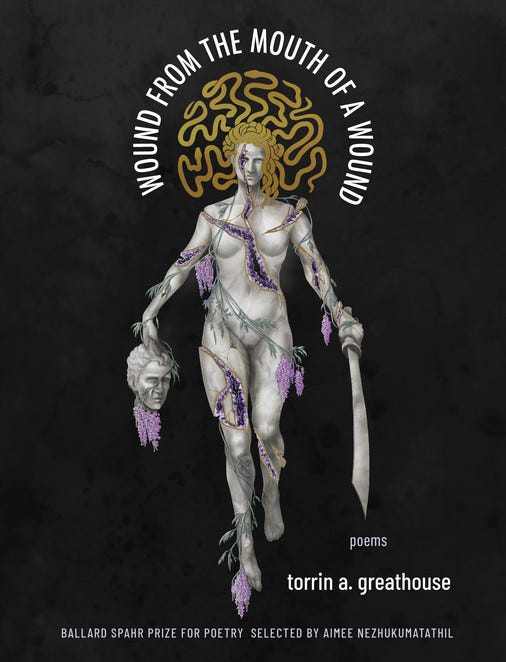A review of torrin a. greathouse’s “Wound from the Mouth of a Wound”

Reading torrin a. greathouse’s full-length debut is like witnessing a brilliant fire dismantle down to the foundations and begin anew, triumphant. Burning is a recurring theme in Wound from the Mouth of a Wound, a collection that highlights the violence done to trans and disabled individuals, by family and by the medical system, in trying to insist that their value is in “the making of my body/ a meal, in my devouring.” greathouse’s poems refuse to work within these established systems. Instead, she carves a new way forward, using poetic forms and language that center lived experiences long-hidden or dismissed.
The opening poem, “Medusa with the Head of Perseus,” sets the tone:
“My mother
disowns me & suddenly I am a folktale.
Am I the serpent-headed girl? Or her endless
reflection? Or the winged mare burst
forth from her blood?”
greathouse’s mastery of language is one of the primary ways she disrupts the binaries of male/female, abled/disabled, myth/reality. As she slowly breaks apart the cycles of familial abuse and transphobic and misogynistic preconceptions of what it means to be a woman, the speaker — and by extension, greathouse — expands the definition of the body across a range of forms. On the more corporeal side of the spectrum: the bridge in “Phlebotomy, as Told by the Blood,” the wisteria tree that grows as much out of memory as it does out of the fingernails. On the other lies a world of multitudes that coexist as layers within the speaker, the “one-girl Armageddon” who tells the reader: “When I began to transition/ it wasn’t into a daughter, but/ instead a flood.”
Similarly, greathouse bends poetic form to cradle her poetics of self, from imbuing footnotes with a critical edge and erasure poems to a complete rethinking of a poem’s corporeality in “On Using the Wo|men’s Bathroom” and “Ars Poetica or Sonnet to Be Written Across My Chest & Read in a Mirror, Beginning with a Line from Kimiko Hahn.” One of greathouse’s dazzling feats is to remind readers of poetry’s malleability. To insist otherwise means restricting and denying the existence of alternative possibilities and experiences and refusing the reality of the ongoing violence experienced by trans and disabled people.
greathouse returns to the question of mythologization throughout Wound from the Mouth of a Wound by revealing how medical examinations and procedures become a search for inherent meaning. In “On Examination/Dereliction,” greathouse describes “Your nurse who calls/ this body Sir. Your doctor who calls it Ma’am.” In doing so, she addresses the presumptions that are imposed onto the speaker’s body and the violence that follows soon after as “the body/ becomes an excuse. Collection of reasons/ for its own abandonment.” The speaker finds herself having to constantly maneuver around these rules, at times putting her recollections on pause— “Forgive me./ I cannot find the poem in all of this, but I can’t bear to let it go/ unspoken.” — to remind the reader that poetry operates in the service of truth, as greathouse put it herself when she asked, in an interview, “What does it mean to not write towards beauty as a trans woman but to write towards ugliness?”
It is in these moments of acknowledgement from the speaker, most prominently in “Hapnophobia or the Fear of Being Touched,” that the poems’ spatial and temporal continuity is palpable. These poems speak to an exhaustion and frustration but also demonstrate a fierce determination, by greathouse and her speaker, to dictate the rules of presence for oneself.
If Wound from the Mouth of a Wound is a fire, then it is one that heals as much as it destroys: creating out of the ashes a devastatingly beautiful collection that speaks to the constant processes of writing and rewriting the self, for which poetry acts as a form of knowledge that reaffirms one’s existence even when society tries so hard to deny it.
(Re)making the Self Through Language was originally published in ANMLY on Medium, where people are continuing the conversation by highlighting and responding to this story.
